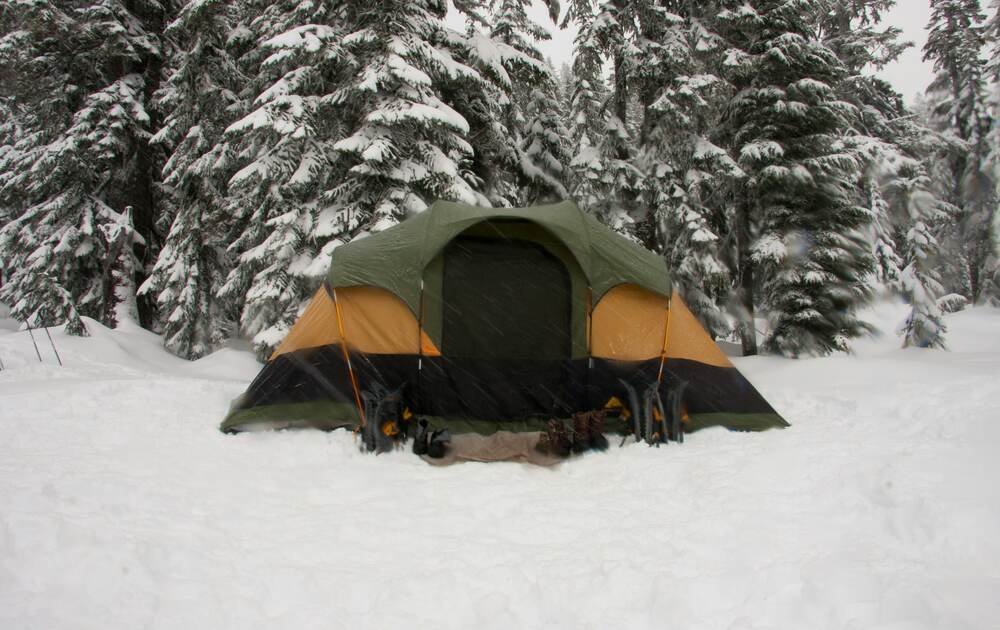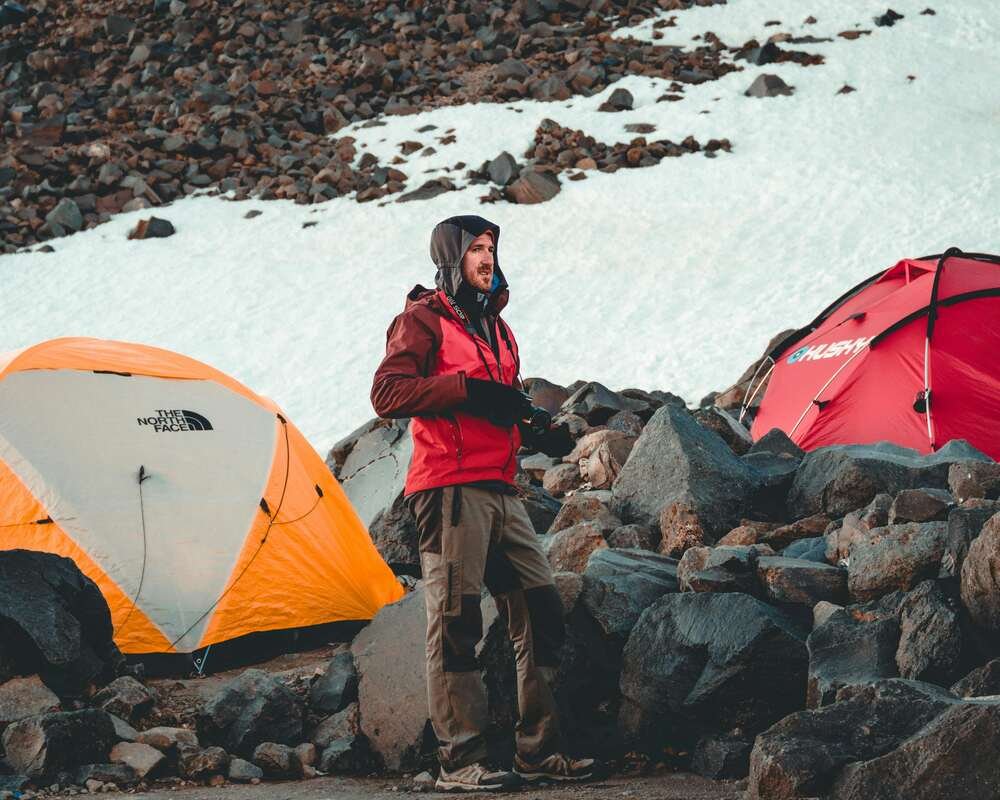When camping in winter you are going to be cold if you don’t do it right. When camping in Finland you don’t want to forget your thick socks. In fact, you’ll need much more than that. It’s cold, very cold. Temperatures are known to reach -30℃ in Urho Kekkonen National Park. Proper preparation is required.
While I don’t recommend camping in Urho Kekkonen for newbie campers there are some wonderful winter camping opportunities elsewhere.
You can stop being cold when camping in winter by wearing moisture-wicking layers, insulating mid-layers, and waterproof outer layers. Purchase a sleeping bag rated for winter temperatures. Use an insulated sleeping pad, it’ll prevent heat loss from the ground. Also, keep dry at all times, it is important to limit moisture because this increases heat loss.
Popularity of winter camping
The summer still remains peak camping time, but winter camping is extremely popular too. The popularity of winter camping increased by 40% during the pandemic. Interestingly it hasn’t fallen now Covid is less prevalent.
“Travelers have every option available to them again, but winter camping remains at an all-time high. People bought the gear, braved the elements and fell in love with enjoying the great outdoors at a quieter, cozier time of year.”
The dirt
Due to this increase in popularity winter camping sales have increased. There has been a notable uptick in sales for sleeping bags, thermal clothing, and cold weather tents. Camping retailers have seen demand rise for winter-specific equipment. This indicates winter camping isn’t going away any time soon.
Things to do to keep warm
So now you’ve discovered winter camping is possible, it is time to prepare. You don’t want to look like Jack Nicolson at the end of the Shining. Taking on the cold requires a game plan. Here are a number of strategies to remain safe and cozy in winter.

Invest in Good Gear
There’s really no way around this. It’s time to get out the credit card or ask your mum to knit you a sweater.
- Tent – Forget about your moldy old tent in the shed. A four-season tent is vital. Find one that is designed with winter conditions in mind. If you are thinking about a pop-up tent forget it! You need a winter tent that is tough enough to cope with strong winds and heavy snowfalls. Look for good insulation properties too.
- Sleeping Bag – Check the temperature range of the sleeping bag. It should have a temperature rating below what is expected at your future campsite. Mummy sleeping bags offer better heat retention, they are often praised for their warmth.
- Sleeping Pad – You need some insulation from the freezing ground. The cold ground will pull heat from your sleeping bag, so a good sleeping pad will insulate you. It is even more effective with a closed cell foam mat underneath.
- Clothing – There is an art to putting on clothes for winter camping. You’ll need to layer up with moisture-wicking thermals made from wool or synthetics. Then, add a warm insulating mid-layer, this could be a fleece or down. And finally a waterproof and windproof outer shell. Remember to bring warm socks, gloves, a hat, and a mask or neck gaiter.
- Stove – A good camp stove that works well in cold temperatures is required. You’ll be melting snow for drinking water and cooking hot meals to keep you warm and full. Liquid fuel stoves are reliable in winter.
- Headlamp – When navigating low light conditions a good headlamp is vital. Make sure it’s a decent brand and has plenty of battery life.
Plan your meals
Bring plenty of high-calorie meals. They should be easy-to-prepare and provide your body with energy to generate heat. Hot drinks are a must, so bring your thermos. Eat a meal close to bedtime. Your body will generate heat digesting the meal. The whole process will warm you up. Choose high fat, high calorie foods.
Learn cold-weather cooking. You need to know how to use a stove in freezing temperatures. You need to be as efficient as possible and not spend too much time burning through your fuel.
Setting up your camp
Your camp set up will be another factor in keeping you warm.
- Choose a Good Location – Don’t just pitch up anywhere on the campground. Look for a sheltered spot that is away from strong winds. Setting up your camp on a slight incline will allow for water to drain away.
- Dig a Trench – This might not be acceptable to the owner of the campground, but if you are wild camping consider digging a shallow trench around your tent. A trench will help you channel away the melting snow and prevent any pooling under your tent.
- Pitch Your Tent Properly – If you are still relatively inexperienced, practice setting up your tent in the garden before you go. You have to ensure all guy lines are taut, this way you’ll be secure against the wind.
Staying Warm at Your Campsite
- Layer up – Keep those thermals on! You should also be wearing insulating mid-layers and an outer shell throughout the day.
- Stay Dry – It is your mission to stay as dry as possible. Sweaty moisture ridden clothes will rob you of heat. Before bed, change your socks for a nice fresh pair. Make sure you are wearing layers that are dry at night.
- Eat Regularly – Snacking at home all weekend might not be a good idea, but when winter camping it is encouraged. Maintain your energy levels by eating high-calorie meals and snacks throughout the day. Peanuts and energy bars are great.
- Drink Plenty of Fluids – A dehydrated person may feel colder than the average person. Keep hydrated by drinking lots of water. Keep sipping even if you don’t feel thirsty.
- Hand and foot warmers – I love these! Use a hand or foot warmer inside your gloves and boots for a boost of warmness. You can even put them in your socks before you go to sleep.
- Warm Up Your Sleeping Bag – Before you sleep you could fill up a hot water bottle or even a stainless steel water bottle. If it is too hot to the touch then wrap it in cloth to avoid burns. You’ll forget all about the cold with this tip.
- Sleep With a Full Stomach – not recommended in the real world, but out in the wilderness it is a great way to raise your body temperature and promote better sleep.
Things to avoid to keep warm
Winter camping is an incredible experience when done right. But remember it requires a degree of caution and preparation. It is certainly more challenging than fair-weather camping. There are definitely some things you want to avoid in order to keep warm.
Don’t underestimate the cold. Winter temperatures can plummet quickly, especially in colder foreign lands you are not used to. Even during the day the weather can change quickly.
Invest in moisture-wicking clothing, it will pull moisture away from your body. Don’t just pick from your old wardrobe.
Soldiers training in the arctic are regularly told,
“One thing they tell us all the time is, if you sweat up there, you die,” Sgt. Mark Hall said.
You shouldn’t die, but you’ll take a long time to warm up if you are sweaty and moist.
Don’t ignore the weather forecast. Keep a close eye on the weather. Check before and during your trip. Be prepared to adjust your plans and seek more substantial shelter if bad weather approaches. No need to be a tough guy!
Don’t bring the wrong gear. This misstep will go a long way to keeping you cold. You must invest in specialized gear when camping. Avoid unrated sleeping bags for cold weather. Make sure you have a reliable stove that functions at sub zero temperatures and even have a backup. A sturdy four-season tent is a must. Your kids’ tent just won’t cut it.
Don’t skip hydration. This was mentioned earlier in the article, but it is worth mentioning again. Being properly hydrated is extremely important. It helps keep you warm. Keep the flask close at hand and drink even if you don’t feel thirsty.
Conclusion
Treat winter camping with the respect it deserves. A cavalier attitude could endanger yourself or others. Winter camping requires careful planning and an investment in good quality gear. Bad gear choices could be the difference between warmth and hypothermia.
Consider where you are going. If it is your first time, avoid going on your own. An experienced camper in your group will show you the ropes and ensure your safety.
Winter camping offers a wonderful opportunity to test yourself in a frozen land. It will be an experience you won’t forget in a hurry. So research your destination, seek out the correct gear and put these winter warming tips into action.


Pingback: What are the Car Camping Essentials for a Blissful Adventure?
Pingback: Is a pop-up tent suitable for any adventure? - novus places
Pingback: How do you keep safe when camping in extreme heat?